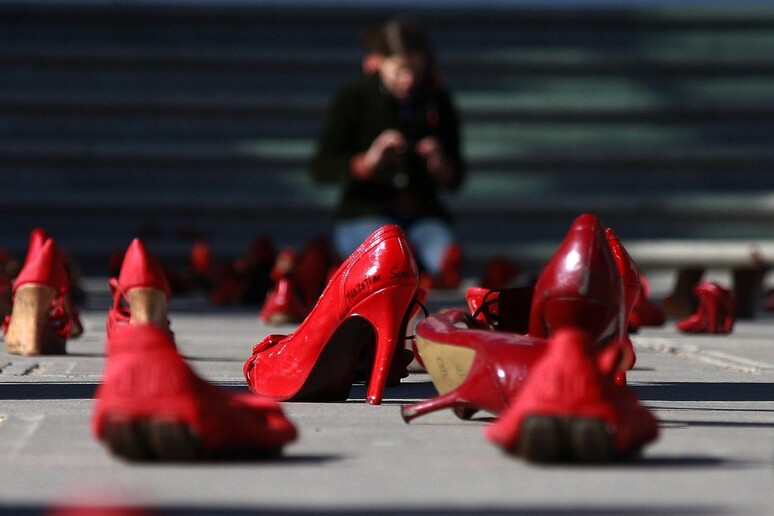There is a blood-red sneaker to recall the memory of a 16-year-old girl's body found in a park.
Wire flowers of a woman who asks for forgiveness, saying "I did it for my children". And then there is a noose that killed Reyhaneh Jabbari in Iran and the intense eyes of Malala Yousafzai, who did not let even the Pakistani Taliban stop her from standing up for women's right to education.
Cristina Silvestri - who goes by the name of Tara - is the first artist with which the Scarpe Rosse (Red Shoes) foundation will make its debut on the International Day for the Elimination of Violence against Women. The association was created by a group of women to speak about women through art. The name was borrowed from the 'Zapatos Rojos' (red shoes) with which the Mexican painter spoke about 'femicide' for the first time, denouncing the hundreds of women taken hostage, raped and killed for years in Ciudad Juàrez without anyone being held accountable for it. "The idea," Scarpe Rosse chief Tiziana dell'Orto told ANSA,"is to choose some symbolic dates - such as November 25 or March 8 - to speak about a series of themes experienced 'from a female point of view'. We start with violence, through the work of an artist that is still unknown, in order to offer her an opportunity. Her works will be on sale for a symbolic price, since for us the aim is more that people bring home with message with them than to raise funds. Proceeds will then go to a non-profit organization that works on the issue selected. We begin with figurative art, but we already have many ideas also for music, film and poetry." The first appointment will thus be on November 25 at Villa Letizia in Rome, with l'Arte Incontra le Scarpe Rosse (Art Meets Red Shoes) and works by Tara, who worked at art galleries until finding her vocation "on the other side" of the easel. "Four years ago," she said, "I became passionate about the story of Elina Chauvet, who painted those red shoes as if they had been stained by blood. I started from there as well, with an installation for a nightclub in the Marche region. It was supposed to be only for one event and then they ended up leaving it there." Her work centers on recycled materials and newspapers. "What people throw away," she said, "I take and I revive it on the canvas. Recycling has very strong energy and perhaps shoes more than anything else, since every design has its own personality. It tells of a woman and her story." Such as in the case of the raft on a canvas dedicated to a woman "who is exploited and underpaid", who died a few months ago while she was working in the fields. Tara said that her works were a sort of contemporary "Pop Art in which I deal with such serious issues as war, Ebola and alcoholism. In my opinion, if you decide to make art you should tell the reality." She cuts newspapers, pastes them and transforms news and headlines into work. "I began by collecting a magazine in a neighborhood cafe.
It told a heartbreaking story that did not deserve to be thrown away, as if it were nothing." From paper that has been "used" and destined to become pulp, the pages thus become things like 'Lamette' ('Razor blades'), a work dedicated to the 140 million girls who have suffered genital mutilation. "Newspapers," Tara continued, "are disappearing. In a few years we will find out about a story only through the internet.
And so we plasticize them and resinate them to protect them and make them immortal." The result is a sort of magnifying glass on a myriad stories from La Repubblica, Panorama, Corriere Della Sera, Internazionale, L'Espresso, La Stampa, Avvenire, Il Manifesto and Il Giornale: from Malala's struggle "long before the Nobel" to the bloodied Superga of 'Andavo a Scuola' ('I Was Going to School') or 'Stzhmongshan', a denunciation against "that sort of Chinese labor camp where women work 16 hours a day and risk death by intoxication". And then there is Reyhaneh on a front-page, wearing a veil on the witness stand in 2014 while she pleads innocent to charges of having killed her rapist. Wire netting, a rope and a noose rapidly convey her end. Every story has its background, where Tara sums up the incident. "All are true stories," she said. "And there are enough details so that those that want to can go and find out more."
ALL RIGHTS RESERVED © Copyright ANSA











